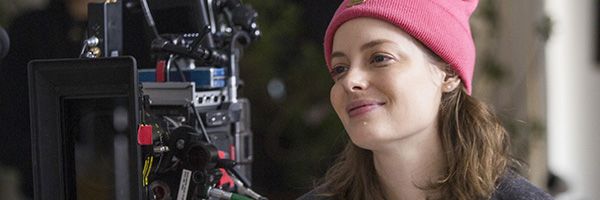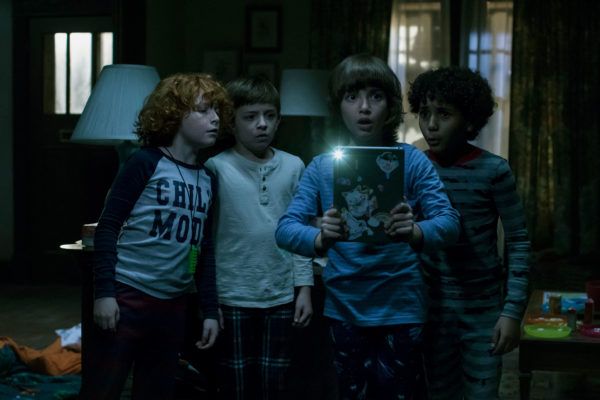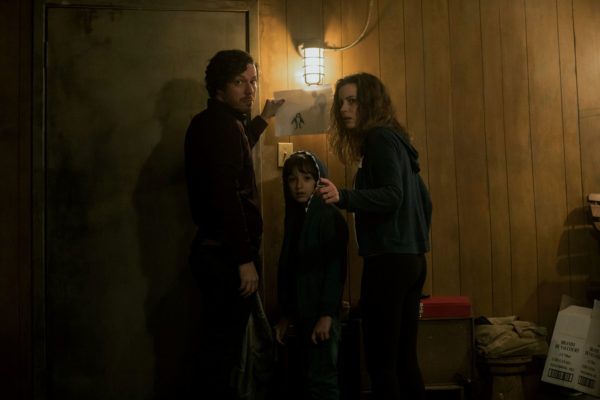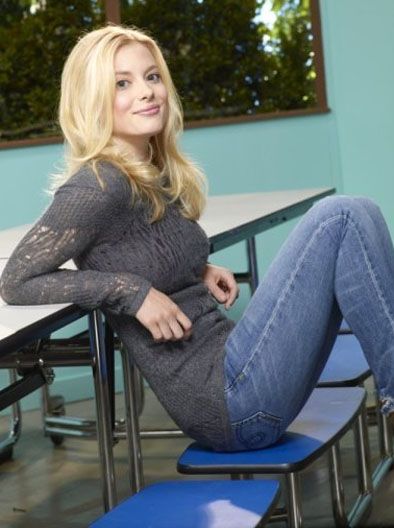From writer/director Jacob Chase and based on his short, the horror flick Come Play follows a lonely young autistic boy named Oliver (Azhy Robertson) who wants connection with friends but instead turns to his cell phone and tablet for company. When a mysterious creature called Larry uses those devices to enter the real world, Oliver’s parents (Gillian Jacobs and John Gallagher Jr.) must overcome their own differences in order to protect their son.
During this 1-on-1 phone interview with Collider, actress Gillian Jacobs talked about what sold her on this project, why seeing intense adult dramas growing up was way scarier than horror movies, how much she enjoyed working with her young co-star Azhy Robertson, the benefit of having a practical creature on set to react to, and how she feels about the story’s ending. She also talked about revisiting her character for a Community cast Zoom and whether they still hope to do a movie, voicing a superhero for the animated series Invincible, and directing an episode of Marvel’s 616.
Collider: I am always happy to be talking about a creepy movie, right at Halloween. When this came your way, what was it that most appealed to you?
GILLIAN JACOBS: For me, it appealed to me greatly to do a genre that I haven’t done much in the past. I’ve done a few things. I was in a Blumhouse movie, and I did something that was more of a horror comedy, this movie Bad Milo, but I haven’t been in a movie quite like this. And so, as an actor, I’m always looking to do something that I haven’t done recently. And then, I met Jacob [Chase], the writer/director, and I thought he was so smart and such a nice person. I really respected him as a director and I thought his idea to have a puppet for Larry, to do it as a practical effect rather than CGI, was really brilliant. That’s what sold me. Jacob loves haunted houses and making horror films but he is the sweetest, nicest guy.
Do you remember the first time you saw a horror movie?
JACOBS: I didn’t see traditional horror movies. It was more like I was taken to movies at too young of an age. I remember that my mother took me to a Lars Von Trier movie when I was way too young. That was very scary for me but that was not a traditional horror movie. It was more in the vein of I saw movies that I probably was much too young to see, that disturbed and scared me as a child, rather than watching Friday the 13th.
For me, the family aspect of a story like this and the terror that comes from a family that’s threatened that’s way scarier than monsters.
JACOBS: Yeah. I remember going to see the Kenneth Lonergan movie, You Can Count On Me, with Laura Linney and Mark. Ruffalo. My mother and I saw that movie and were just sobbing and crying and holding each other. I also remember going to this Tilda Swinton movie, The Deep End, with my mom where my mom was just crying. So, I just saw more adult dramas as a kid than I did horror movies.
I really like that this is an Amblin film because they’ve never really shied away from putting kids in jeopardy or in scary situations. Why do you think it is that kids in peril is so effective in horror movies when it comes to being terrified?
JACOBS: I don’t know. Someone brought up something that I’d never thought of before, that it’s also the basis of Grimm’s fairytales with kids. The original versions are very scary with lots of gruesome, terrible things. It’s just a storytelling trope or something narratively that really works.
I love the mother-son dynamic in this and with the extra layer of the son being autistic, it really creates such a deep bond between these characters. What did you enjoy about playing that mother-son dynamic?
JACOBS: I really just loved working with Azhy [Robertson]. I think that he’s a tremendous actor and he’s gonna have an incredible career. Jacob always jokes that he’s working more than all of us. I think he’s a real talent. It was like working with any other actor. I found it very easy with him. I can’t say enough good things about him.
What was it like to actually have that practical creature around? What was the first time you had to interact with it?
JACOBS: They tried to keep it away from us until we are in a scene with it, and it was genuinely scary. Without giving away too much, it gets pretty close to me in the film and my screams of terror were not acting. I genuinely yelled. I remember we did one take and I genuinely screamed and I was like, “Jacob, you have to use that take because that was real.” They did an amazing job constructing this puppet. And also, I have to say that the puppeteers – and there were at least four of them – really have to work together and they’re operating separate limbs. I thought that they did such a beautiful job of bringing the character to life. It was really amazing to watch them all work because that’s not an opportunity you get too often anymore, to work with puppeteers like that. That was really cool to see.
Especially when it’s a creature of this size.
JACOBS: Yes, and I’m telling you, I don’t know how tall it was but it was tremendously tall. That is not an optical illusion. It’s not some filmmaking camera trick. They built an incredibly tall puppet. And so, that made everything all the more difficult for the puppeteers but all the more impactful for the audience.
What was the atmosphere like on set, when you were actually in scenes of it? Did you ever joke around about it or was it just creepy that it was there?
JACOBS: Yeah, it’s creepy but with the puppeteers, that’s such a difficult job that you wanna be respectful of the fact that they’re trying to coordinate [all of the limbs], so I tried not to be too jokey on set because I realized what a difficult job they had and how much coordination it took. But it was cool to see.
Without spoilers, how did you feel about the ending of the film and where your character ultimately ends up? What was your reaction, the first time you found that out?
JACOBS: I was surprised. It was not how I thought the film was gonna end. It’s not the stereotypical, typical ending of a movie. I was thinking this movie would end much like a lot of other films that I’ve seen, so I was very surprised. I thought it was a surprising ending.
One of the bright lights and all of us being stuck at home during all of this craziness is that we’ve gotten a lot of cast reunions that we wouldn’t have otherwise been blessed to get. What was it like revisiting Britta for your Community Zoom?
JACOBS: It was so funny, I realized that I was one of the only people in the cast who didn’t rewatch the episode right before we did it because they were doing their ad-libs that were not in the script but were what they’d actually said on the day that made it into the episode, and I was just reading the script. So then, I felt like, “Oh, I Britta’ed it by not rewatching it.” I can’t tell you how happy it makes me to be around those people, whether it’s on a Zoom screen or in person. It really does feel like my family. It feels like we’re siblings or cousins or something, and not just the people I worked with for six years, so that was really great.
Do you think that we’ll ever actually get a reunion? Is that something that you still root for?
JACOBS: Absolutely! I would love to do the movie. I think we all would like to do the movie. I think you should ask Dan Harmon this question, to see if he has a script yet. I think we all want to do the movie.
Was there a point in Community where you realized what Britta’s strengths were and really relished in leaning into that and utilizing that?
JACOBS: Yes, the baggle episode, which I think was in Season 1, or when they started calling her the worst, I realized that’s what made the character funny and distinct and unique, and that I shouldn’t shy away from any of that. That was what made her great as a character, her increasing awkwardness and her failed attempts at connection. I loved, in the first season, the “Hit me with your Genie’s bottle,” or rowboat cop. I did recognize that it wasn’t exactly how she was written in the pilot but the way they took the character made her much funnier and much more fun and felt like much more of a distinct, unique character, so I tried to embrace that.
And it’s really cool that you were able to do that because you might not have been able to do that on another show.
JACOBS: Yeah, and I loved it. I can’t tell you what it’s like to be on a show that you’re a fan of. At eight o’clock on Thursday, the episodes would go up on TV and we would usually still be there shooting, and we’d try to run to our trailers to watch the episode, and then they’d be trying to pull us out of our trailers to keep shooting the show. That’s not always the case when you’re on a TV show. We all felt very lucky that we were on such an innovative television show, and we knew it.
You’re voicing a character for an animated superhero series, with Invincible. What’s it like to get to bring a superhero to life?
JACOBS: Invincible is based on the graphic novel by Robert Kirkman and what I love about it that they are superheroes with human problems. She is a girl with tremendous superpowers but also insecurities and all of the struggles of being a high school student, as well. Obviously, Robert Kirkman is a tremendous writer and Invincible is a very beloved graphic novel. I just felt lucky that they wanted me to be a part of it.
It seems really fun to play a superhero that can be more relatable.
JACOBS: Yeah, I think that’s why I liked The X-Men cartoon when I was a kid. The X-Men felt more like teenagers or tweens, and they had problems in addition to their superpowers. I’ve always been drawn to characters like that.
I love that you also directed an episode of Marvel’s 616. What was it like to get to dig into comics on that side of things and learn stuff that you probably had no idea about?
JACOBS: I knew nothing about it, so it was all a discovery for me and it was really cool. I got to speak to women who worked at Marvel comics over the decades, from Jo Duffy who was there in the 1970s through Annie Nocenti and Weezie Simonson who are legends of Marvel from the 80s, as writers and editors, all through to women who are working there today. It was really cool to hear their stories about creating these iconic characters. And then, we also have a bit of history in the episode about the comic book industry overall. Through doing that, I realized and learned that there were women writing and illustrating comics, decades prior to what I had ever heard of. That was really amazing to learn about. I didn’t get to go really in depth with any of their stories but even just to have their names and faces in the episode, feels really cool. These women have been a part of comic book history.
What have you learned about yourself as a director from really jumping in and having that hands on experience?
JACOBS: It gives me so much more empathy for a director, when I’m then on a set as an actor. I’ve always tried to be a team player, in terms of being on set and not slowing the day down, but when you’ve been the one who’s directing, you feel that clock ticking in a way that I never really feel it as an actor and I know what that pressure is like. So then, when I go back and I’m on someone else’s set as an actor, I really try to the best of my ability to make their life easier. I think it’s really incredible to have some insight into the entirety of the process, to learn more about production design and cinematography, the sound department, and all of the things that go into making a project. When I then step onto the set as an actor, I feel like I have a greater understanding of everything that’s going on around me and what my part in it is.
Is it something that you want to keep doing?
JACOBS: Yes, I would absolutely love to keep directing.
Come Play is out in theaters on October 30th.
Christina Radish is a Senior Reporter of Film, TV, and Theme Parks for Collider. You can follow her on Twitter @ChristinaRadish.




